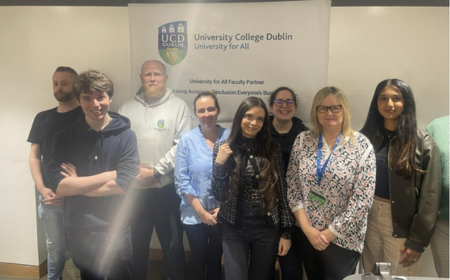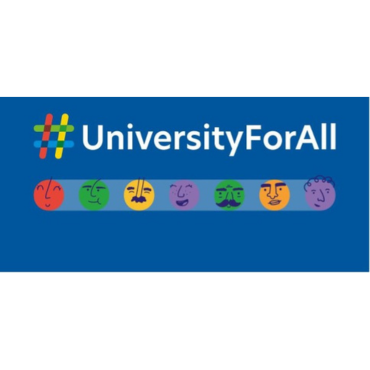.png)

Implementing Universal Design within Practice Learning Environment

Introduction
This project focused on developing the Universal Design in Clinical Practice Learning Guidelines to promote inclusive learning environments for nursing students in clinical settings. Using a co-design approach, nursing students collaborated to adapt the Universal Design for Learning (UDL) framework, ensuring the guidelines address diverse needs and practical challenges. The process involved workshops, iterative feedback, and expert review, culminating in a resource that supports equitable and accessible clinical education. A follow-up implementation workshop with practice educators explored enablers and barriers to embedding the guidelines, highlighting their potential to transform clinical practice learning into inclusive, student-centred environments.
Project Outline
This project aimed to develop the Universal Design in Clinical Practice Learning Guidelines to create inclusive clinical learning environments for nursing students with diverse abilities, backgrounds, and needs. Conducted as part of University College Dublin’s University for All Faculty Partnership Programme, the project was funded through the Strategic Project Fund of the Higher Education Authority (HEA). It was grounded in the Universal Design for Learning (UDL) framework developed by CAST (2018), an evidence-based approach to inclusive education. UDL emphasises providing multiple means of engagement, representation, and action/expression to address learner diversity. By anticipating and removing barriers, UDL ensures all learners, regardless of their needs, can access, participate in, and succeed in their education. While UDL is widely applied in classroom settings, this project is the first to adapt the framework specifically for clinical practice learning in nursing education.
Methodology
Recruitment of Participants:
A diverse group of nursing students was recruited through an open application process. Selection aimed to ensure representation across different backgrounds, abilities, and experiences to reflect the diversity of students in clinical practice settings.
Workshops for Co-Design:
Three structured, four-hour workshops were held to facilitate the co-design process. During these sessions:
Students were introduced to the CAST UDL guidelines (2018) and their three principles: engagement (how learners are motivated), representation (how information is presented), and action/expression (how learners demonstrate understanding).
Students collaboratively reviewed the guidelines and adapted them to address the challenges and realities of clinical practice learning.
Discussions focused on barriers nursing students encounter in practice environments, such as communication challenges, varied learning styles, and differing abilities, and how UDL principles could be practically applied to overcome these.
Drafting the Guidelines:
Insights gathered during the workshops were synthesised into an initial draft of the guidelines. The draft incorporated student contributions, ensuring that recommendations were practical, context-specific, and reflective of their lived experiences.
Iterative Feedback and Refinement:
The draft guidelines were shared with the student collaborators via email for additional feedback. This iterative process enabled further refinement and ensured the guidelines captured the breadth of student needs.
Expert Review:
The refined guidelines underwent expert review by specialists in nursing education, inclusive teaching, and clinical practice to ensure they were academically sound, practical, and implementable in real-world settings.
Implementation Workshop with Practice Educators:
A follow-up implementation workshop was conducted with clinical practice educators to explore enablers and barriers to embedding the guidelines in practice. Educators provided practical insights into how the guidelines could be integrated into clinical learning environments and identified potential challenges and solutions.
Impact
The finalised Universal Design in Clinical Practice Learning Guidelines provide a pioneering, student-centred resource to promote inclusive learning in clinical settings. By applying UDL principles, the guidelines aim to ensure all nursing students can fully engage with and succeed in their practice-based education.
The co-design process, funded through the HEA Strategic Project Fund, placed nursing students at the heart of development, ensuring the guidelines are practical, meaningful, and responsive to real-world challenges. Student engagement fostered ownership and relevance, while expert input guaranteed academic rigour. The follow-up workshop with educators highlighted actionable pathways for implementation and the potential to address systemic barriers to inclusivity in clinical practice learning.
This project underscores the transformative potential of UDL in clinical education, offering a scalable and innovative approach to fostering equity, accessibility, and success for all nursing students in practice-based environments.
Project Outputs
Gilmore, J. P., Halligan, P., & Browne, F. (2022). Pedagogy as social justice-Universal Design of Learning in nurse education. Nurse education today, 118, 105498. (opens in a new window)https://doi.org/10.1016/j.nedt.2022.105498
Gilmore, J.P. (2023) ‘Integrating Universal Design for Learning with an Enquiry-Based Learning Approach to Social Justice in Healthcare Education’ in Padden, Elliot, Tonge and Hyland (eds) Learning from UDL Leaders: UCD University for All Faculty Partner Case Studies 298-311 Access and Lifelong Learning, University College Dublin https://www.ucd.ie/universityforall/t4media/UCD_Case_Studies_digital.pdf
Browne, F. (2023) ‘The Design and Implementation of a Scaffolded Approach to Support Multiple Means of Action and Expression’ in Padden, Elliot, Tonge and Hyland (eds) Learning from UDL Leaders: UCD University for All Faculty Partner Case Studies 234-250 Access and Lifelong Learning, University College Dublin https://www.ucd.ie/universityforall/t4media/UCD_Case_Studies_digital.pdf
Student Collaborators
Tamas Thot, Stage 2, BSc Mental Health Nursing
Brian Rusk, Stage 2, BSc General Nursing
Eileen Noone, Stage 4, BSc Mental Health Nursing
Blanca Rodriguez, Stage 4 BSc General Nursing
James Sage, Stage 2, BSc General Nursing
Zlata Kulbako, Stage 2 BSc General Nursing
Pamela Walsh, Stage 2, BSc General Nursing
Tiernan Donegan, Stage 3, BSc Children’s and General Integrated
Sherwin Wilson, Stage 4, BSc General Nursing

.png)

